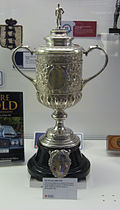| Main page | Indices | Projects |
The University of Oxford portal
The University of Oxford is a collegiate research university in Oxford, England. There is evidence of teaching as early as 1096, making it the oldest university in the English-speaking world and the world's second-oldest university in continuous operation. It grew rapidly from 1167, when Henry II banned English students from attending the University of Paris. After disputes between students and Oxford townsfolk in 1209, some academics fled north-east to Cambridge where they established what became the University of Cambridge. The two English ancient universities share many common features and are jointly referred to as Oxbridge.
The University of Oxford is made up of thirty-nine semi-autonomous constituent colleges, four permanent private halls, and a range of academic departments which are organised into four divisions. Each college is a self-governing institution within the university, controlling its own membership and having its own internal structure and activities. All students are members of a college.
It does not have a main campus, but its buildings and facilities are scattered throughout the city centre. Undergraduate teaching at Oxford consists of lectures, small-group tutorials at the colleges and halls, seminars, laboratory work and occasionally further tutorials provided by the central university faculties and departments. Postgraduate teaching is provided in a predominantly centralised fashion.
Oxford operates the Ashmolean Museum, the world's oldest university museum; Oxford University Press, the largest university press in the world; and the largest academic library system nationwide. In the fiscal year ending 31 July 2023, the university had a total consolidated income of £2.92 billion, of which £789 million was from research grants and contracts.
Oxford has educated a wide range of notable alumni, including 30 prime ministers of the United Kingdom and many heads of state and government around the world. 73 Nobel Prize laureates, 4 Fields Medalists, and 6 Turing Award winners have matriculated, worked, or held visiting fellowships at the University of Oxford, while its alumni have won 160 Olympic medals. Oxford is the home of numerous scholarships, including the Rhodes Scholarship, one of the oldest international graduate scholarship programmes. (Full article...)
Selected article
The 1874 FA Cup Final was played between Oxford University A.F.C. and Royal Engineers A.F.C. on 14 March 1874 at Kennington Oval in London. It was the third final of the world's oldest football competition, the Football Association Challenge Cup (known in the modern era as the FA Cup). Both teams had previously reached the final but been defeated by Wanderers F.C. The Engineers had reached the final with comparative ease, scoring sixteen goals and conceding only one in the four previous rounds. Oxford's opponents in the earlier rounds had included two-time former winners Wanderers. The final was decided by two goals from Oxford in the first twenty minutes. Their opponents had spent two weeks training for the match, an innovative concept at the time, but were repeatedly thwarted by Charles Nepean, the Oxford goalkeeper. The Engineers were said to have missed their best back, Lieut. Alfred Goodwyn, who had been posted overseas. The 1874 final was the only occasion upon which Oxford University won the FA Cup; the team made further appearances in the 1877 and 1880 finals, but lost on both occasions. (Full article...)
Selected biography
Selected college or hall
All Souls College was founded by Henry Chichele (the Archbishop of Canterbury) and King Henry VI in 1438. There are no undergraduates at the college, although there have been at some stages of its history, but the Codrington Library is open to some students from the wider university. All of the college's members are Fellows, including many distinguished scholars. Several of the university's professorships are attached to the college, such as the Chichele Professorships and the Marshal Foch Professor of French Literature. Many academics from overseas spend time at the college as Visiting Fellows. All Souls is centrally located on the High Street, near the Bodleian Library and the University Church of St Mary the Virgin. The chapel contains a complete set of misericords from the 15th century. The architect Nicholas Hawksmoor remodelled much of All Souls in the 18th century. The customs of the college include a feast every one hundred years (last held in 2001) at which the Fellows parade around All Souls, carrying flaming torches and singing the "Mallard Song", to commemorate an incident when a mallard is said to have flown out of the foundations as it was being built. (Full article...)
Selected image

Did you know
Articles from Wikipedia's "Did You Know" archives about the university and people associated with it:
- ... that Sir Douglas Dodds-Parker, a junior Foreign Office minister during the Suez Crisis in 1956, was sacked by new Prime Minister Harold Macmillan (pictured) in 1957 for his private opposition to the invasion of Egypt?
- ... that English headmistress Olive Willis founded Downe House School, where her chauffeur-architect-engineer slept in her bathroom?
- ... that Sir William Gregory was appointed Speaker of the House of Commons in 1679 after only a year in parliament?
- ... that Giles Clarke, chairman of the England and Wales Cricket Board, studied Arabic at the University of Damascus?
- ... that the Welsh Tractarian priest John David Jenkins, known as the "Rail men's Apostle", became President of the Amalgamated Society of Railway Servants?
Selected quotation
Selected panorama
On this day
Events for 5 June relating to the university, its colleges, academics and alumni. College affiliations are marked in brackets.
|
Births
|
Deaths
|
Wikimedia
The following Wikimedia Foundation sister projects provide more on this subject:
-
Commons
Free media repository -
Wikibooks
Free textbooks and manuals -
Wikidata
Free knowledge base -
Wikinews
Free-content news -
Wikiquote
Collection of quotations -
Wikisource
Free-content library -
Wikiversity
Free learning tools -
Wikivoyage
Free travel guide -
Wiktionary
Dictionary and thesaurus
© MMXXIII Rich X Search. We shall prevail. All rights reserved. Rich X Search













